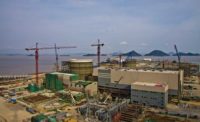States are scrambling to site small modular nuclear reactors under development and funded by $452 million in federal grants; four design concepts have been submitted by companies.
As the U.S. Energy Dept. weighs how to disburse $452 million in grants to develop small modular nuclear, or SMR, reactors, which have less than 300 MW in capacity, several states are pushing to host construction of the innovative facilities.
Four firms have submitted SMR design concepts to DOE for a chunk of the funds to complete designs and license them with the Nuclear Regulatory Commission: Babcock & Wilcox for its 180-MW mPower design; NuScale Power, in which Fluor Corp. has an interest, for a 45-MW design; Westinghouse Electric for its 225-MW Westinghouse SMR design; and Holtec International for its 160-MW SMR-160 design. DOE wants SMRs in commercial operation by 2022.
NuScale and Holtec both have signed separate agreements with DOE's Savannah River site in South Carolina to host SMRs. NuScale already is working with DOE to identify a site. In a speech last month, Gov. Nikki Haley (S.C.-R) said the state would support the facility push. "We want both of them," she said. But in a letter last month to Energy Secretary Steven Chu, Washington state lawmakers asked DOE to consider the Hanford nuclear site for an SMR to spur economic growth as federal funding there declines. They say the site of Energy Northwest's Columbia Generating Station, a nuclear powerplant that leases land at Hanford, could fit more than the single reactor built there and would be SMR-appropriate.
Whether the current DOE applicants can or would change their SMR sites is not clear. Babcock & Wilcox is working with the Tennessee Valley Authority to build up to six mPower units in Tennessee. Westinghouse has partnered with Ameren Missouri to build its SMR at the utility's Callaway, Mo., site, already home to an operating large reactor. TVA and Ameren Missouri would pay for their SMRs, but NuScale and Holtec have to find their own funding for reactor construction in the absence of paying utility customers.



Post a comment to this article
Report Abusive Comment